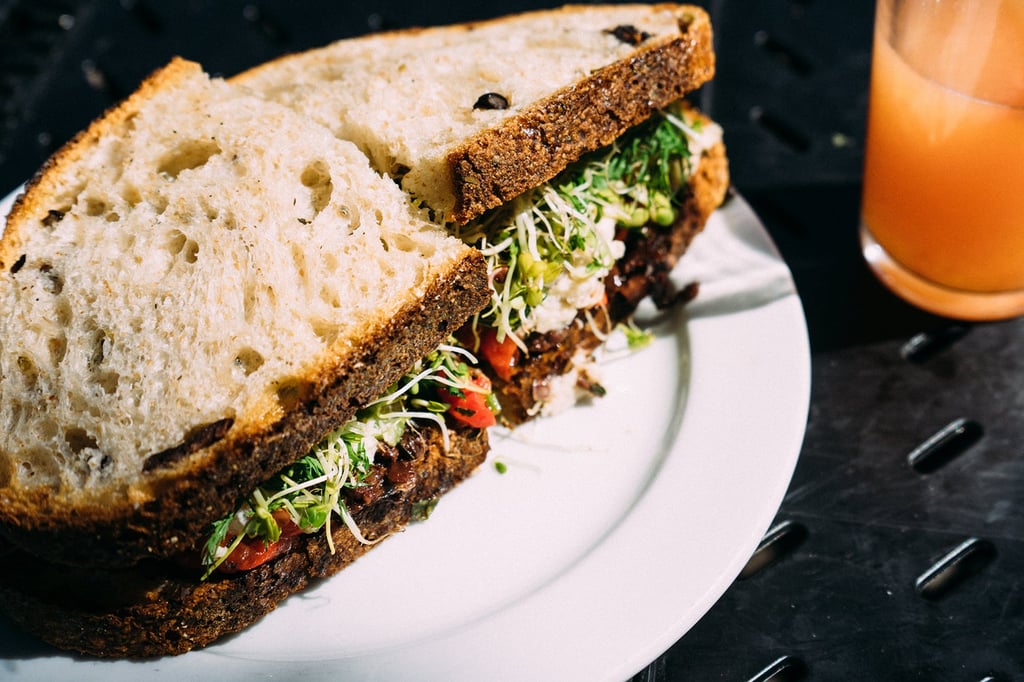Going vegan, eating organic, or simply cutting sugar can all be healthy lifestyle choices. But if doing so gives you anxiety about hanging out with friends (what if there’s nothing I can eat?!) or makes you fear certain foods, it can actually be quite dangerous. Yep, being too healthy can actually be unhealthy.
Orthorexia is an obsession with eating a “pure” diet, which can mean avoiding foods with unhealthy fats, added sugar or salt, genetic modifications, artificial colors, or flavors and preservatives. And it’s becoming increasingly common—in part due to the way
It often starts as a genuine attempt to live a more healthful life, but then becomes out of control.
While it’s smart to care about what goes into your body, it can become a problem if the restrictions start taking over your life. If a behavior is so disruptive that it interferes with work and personal relationships, it could be a sign of a psychological disorder.

Extreme orthorexics will often turn down social invitations, fearing that “healthy” food won’t be available. Or if they opt to risk it, will refuse to touch even a morsel of “impure” food (anything processed, refined, or unhealthy), despite hunger pangs.
In our endeavor to get healthy, we may actually be doing more harm than good, if we don’t understand the physiology of the human body and mind.
Here are the dangers associated with eating too healthy (orthorexia)
Dangers of eating too healthy:
1. Stomach Pains

If you’re on a low-carb diet, you might notice stomach pains. Discomfort can present in relation to low-carbohydrate diets or to specific individuals whose GI tracts are overly sensitive to fiber. Low-carbohydrate diets may result in excess protein and fat intake, which in turn may cause the release of excess gastric acid, impacting the stomach and esophagus. “Low-carb diets are also low in fiber, though, which is important to regulate bowel movements. Without enough fiber, which we can only get from carbohydrate foods, people may feel more gassy, bloated, and constipated.” It’s a good idea to still get fiber from grains and fruit skin, for example, in order to stay regular.
2. Wierd Bowel Movements

On the flip side, if you’re into a higher-carb diet, one of whole grains, fruits, and legumes, you could be eating too much fiber, which can lead to gas and bloating and also loose bowels. “Too much fiber, i.e. fruits, veggies, legumes, and 100 percent whole grains, can cause gas and stomach pains in some people, especially if they aren’t used to it. Fiber passes through our digestive tract whole and therefore can cause symptoms in some.
3. Surprising Weight Gain

Remember, you don’t need to eat all the healthy foods in one sitting. “Too many healthy foods, i.e. avocado, nuts, and olive oil, can also equate to too many calories. Learning proper portion sizes is key to preventing weight gain”. This can backfire if you’re looking for weight loss, especially, as you could encounter weight gain from the additional calories and fats.
For instance, smoothies and juices are right on trend, but they can actually be pretty high in calories and sugars, making them less of a healthy snack or post-workout shake and more of a calorie bomb. This is especially true if you’re used to tossing tons of superfoods in the blender.
Likewise, salads can also become too heavy. It’s a great idea to eat a healthy salad for a light lunch or dinner. However, if you throw in nuts, seeds, avocado, protein, fruit, and more, you could be overdoing it on the good stuff. Too many ingredients could definitely lead to too many calories in a chopped salad. So for a salad, let’s say: stick to one fat serving (i.e. nuts or avocado), one protein (i.e. chicken or egg), and lots of veggies.
4. Easy Burn Out

Here’s another danger of eating too healthy.
Dieting too hard might make eating seem boring, and it can also make you think about whatever you won’t let yourself eat even more so. We must enjoy food in order to be satisfied from meals mentally, and it needs to have a good balance of nutrients to feel full physiologically. Rather than go on a diet that eliminates foods or food groups, focus on what you need to get more of to make your diet more nutrient-rich. For example, set a goal to eat legumes at least four times a week rather than not allowing yourself to eat any sugar at all for a month. You’ll shift your mental energy to enjoying a new variety of food that makes you feel more full, satisfied, and nourished instead of being stressed about not having sugar.
5. Crankiness and anxiety
If you’re not eating enough to regulate your mood and keep cravings at bay, and if you’re losing a lot of weight quickly, it could mess with your emotional state and metabolism, making you cranky, anxious, and maybe even more prone to store fat. Oftentimes, people are not at a healthful weight because they are below their physiological and genetic set point. When your body hits survival mode from low energy intake in relation to energy expenditure, it feels stressed and in survival mode releases excess cortisol and epinephrine, which, in addition to making you feel more stressed and anxious, slows down your body’s energy use (aka slows your metabolism).
What’s more, it can also make you more fatigued, especially during workouts, from not eating enough calories or carbs in particular.
6. Social isolation

If someone is starting to say no to social situations or experiences with others in order to avoid certain foods, the dieting has gone too far. “Oftentimes when people become obsessed with their healthy lifestyle, it also takes significant mental energy away from their work, relationships, and family life.
Friends and family begin to avoid a person with such obsession as no inevitable wants to be constantly coached about healthy eating at every meal.










Your point of view caught my eye and was very interesting. Thanks. I have a question for you.
Thank you for your sharing. I am worried that I lack creative ideas. It is your article that makes me full of hope. Thank you. But, I have a question, can you help me?
I don’t think the title of your article matches the content lol. Just kidding, mainly because I had some doubts after reading the article.
Тренажеры для фитнес-клуба играют ключевую роль в обеспечении эффективных тренировок . Это связано с тем, что с их помощью можно развивать силу и выносливость . Кроме того, могут использоваться для различных видов тренировок.
следует учитывать уровень подготовки спортсменов. Это включает в себя определение бюджета, выделенного на покупку тренажеров. Также следует оценить качество и надежность оборудования .
тренажеры могут быть предназначены для разных групп мышц. Например, беговые дорожки и эллиптические тренажеры используются для кардио-тренировок . Кроме того, они могут быть оснащены различными системами управления .
следует учитывать уровень подготовки спортсменов. Это включает в себя определение потребности в инструкторах или персонале. Также следует оценить стоимость замены деталей и расходных материалов .
следует оценить качество и надежность оборудования. Это включает в себя обеспечение регулярного технического обслуживания. Кроме того, необходимо проверить наличие сертификатов и гарантий.
Для обеспечения эффективности тренажеров необходимо разработать комплексный план тренировок . Это включает в себя обеспечение регулярного мониторинга прогресса. Также необходимо учитывать роль мотивации и поддержки в тренировках .
Установка и обслуживание тренажеров требуют особого внимания . Это включает в себя правильную установку и настройку тренажеров . Кроме того, следует оценить доступность и безопасность тренажеров .
следует оценить уровень квалификации персонала. Это включает в себя обеспечение регулярного мониторинга состояния тренажеров . Также необходимо учитывать роль обучения и поддержки персонала .